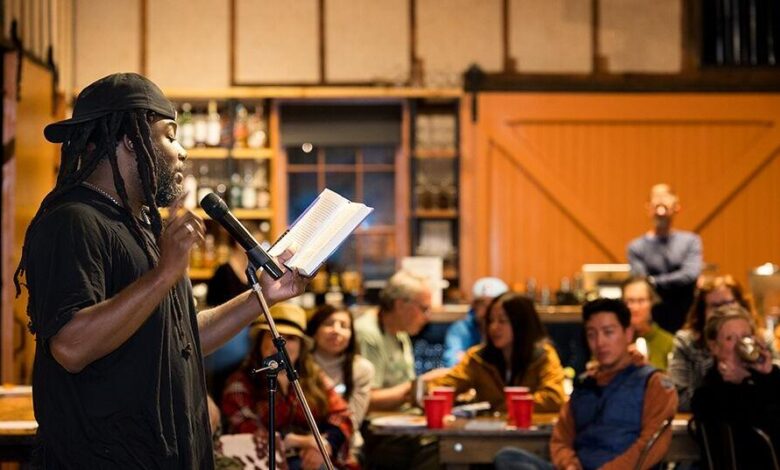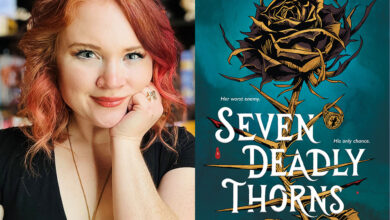Jason Reynolds speaks at LCPL’s Banned Book Week | Local News

Best-selling author Jason Reynolds spoke at Lake County Public Library’s (LCPL) annual Banned Book Week Author Talk at FREIGHT on Thursday, Oct. 9. Reynolds is the author of the nonfiction book “Stamped: Racism, Antiracism and You” as well as many fiction novels for young adults.
Originally from the Washington D.C. area, Reynolds began writing poetry at 9 years old. He published his first collection of poetry in 2001 and published his first novel in 2014, “When I Was the Greatest,” a young adult novel set in his own neighborhood. Reynolds has continued to write young adult novels to this day, including his popular “Track” series.
Reynolds was approached by author Ibram X. Kendi about rewriting his 2016 book Stamped from the Beginning, a non-fiction book about race in the United States. In 2020, Reynolds and Kendi published “Stamped: Racism, Antiracism and You,” a “remix” of Kendi’s original book, intended to be more accessible for readers, particularly young adults.
“Its not actually a pure adaptation, if anything it’s like a reinterpretation,” Reynolds said. “People kept asking [Kendi] if there was a younger version or even one that’s just more eye level and people kept saying ‘we wish we had this when we were younger’ so he asked me about it.”
Reynolds said that he feels the book is effective in its goal because of his background as a fiction writer. He said that the book, which deals with both historical and present-day nonfiction, reads more like a novel.
“Where we sometimes go wrong with nonfiction is we’re so focused on chocking it full of fact that we often aren’t thinking about the reader at all. We’re thinking about giving the reader information and not entertaining the reader,” Reynolds said. “I think all messages sink in more when it’s not heavy handed. When it’s not brow-beat, when you can figure out how to slip in through a little bit of candor and some levity.”
Since its release, “Stamped” has been the subject of challenges and bans in school districts across the country. The challengers have cited “foul and vulgar language” and “divisive topics” as reasons for the book’s removal. Alongside “Stamped,” Reynolds’ fiction works have also been challenged for similar reasons.
Banned Books Week is an annual celebration, organized by the American Library Association, that aims to raise awareness about censorship in literature. Banned Books Week is celebrated locally by LCPL which has hosted a Banned Books Author Talk for the past four years, this year bringing in Reynolds.
The event began with speeches from LCPL director Brena Smith and Jamie LaRue, director of the American Library Association’s Office for Intellectual Freedom, and the Freedom to Read Foundation. Theresa Keeley spoke about teaching Reynolds’ on her as a teacher and two Lake County students read an excerpt from one of Reynolds’ books.
Reynolds took the stage and announced he had a surprise for the crowd. His newest novel, Coach, the latest installment in the “Track” series, did not release until Tuesday, Oct. 14, but Reynolds told the crowd he would read an excerpt from the unreleased novel and that they would be some of the first people to ever hear what he had written.
The excerpt Reynolds chose told a story about the main character experiencing bullying because of his hair and attempting, unsuccessfully, to give himself a haircut at home. Reynolds said that outside of “Stamped,” his novels often tell stories about young adults in ordinary places who live ordinary lives. He said that he wants kids everywhere and in small towns like Leadville to see that their experiences matter.
“I’m just trying to bear witness to their lives. I think that there’s value in that. A mirror doesn’t have to teach the person looking in it anything, it just needs to serve as a mirror, it just needs to reflect. Can you see yourself? That’s enough for me to at least know that I am alive. For me to know not only am I alive but I deserve to be. It’s proof of life and that’s my goal man, that’s my job,” Reynolds said. “I believe that the magic is in the mundane. I believe that the boredom of our lives is actually what some of the most beautiful bits are.”
After reading his excerpt, Reynolds answered questions from the crowd. One crowdmember asked Reynolds how he felt about the fact that “Stamped” and other books of his had been challenged and banned. He said that he did not take pride in the bans and felt hurt by them.
“For me it’s pretty painful. What banning says is that this person has an intention to harm children and I would never do that, it’s the opposite. I write books to make children feel like giants, books to shine light on kids that are oftentimes lurking in the shadows,” Reynolds said. “Because they’re able to slap labels like that on my books, they’re ankle to keep my books from people from children and teachers and libraries and bookstores. I don’t take any pride in it, I don’t want to be a part of no list. It’s not a badge of honor for me. I think it’s pretty disrespectful and harmful.”
After the Q&A segment, the Banned Book Author talk concluded with Reynolds signing books for a long line of readers. He also announced that the “Track” series was in the process of being adapted into a movie or TV show.
Reynolds said that the message of “Stamped” is important because race is a subject that many Americans don’t want to talk about or feel uncomfortable talking about. He said that his goal with the book was to broach the subject of race in an approachable way for readers.
“This was a way for me to say that look, there is a history that cannot be ignored, it doesn’t mean that I’m blaming every white person for whatever misfortunes that have come into my life. This isn’t about blame, it’s about context,” Reynolds said. “Our goal was to contextualize the country in a way that says, ‘Hey, the reason we’re at each other’s throats still is from something that happened hundred of years ago that we still just haven’t healed from because we’ve yet to actually address it, that’s all, and I love you enough to be honest with you in the midst of said discomfort.’”
Source link




